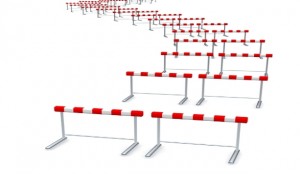Home > Retirement > Hurdles to Retirement – Borrowing Funds from Your 401k
Hurdles to Retirement – Borrowing Funds from Your 401k
 Saving for retirement is a long process. Taking it one step at a time is the only way to accomplish success. However, you can make a poor decision that compounds itself over time. Taking a loan from your 401k is one of those decisions.
Saving for retirement is a long process. Taking it one step at a time is the only way to accomplish success. However, you can make a poor decision that compounds itself over time. Taking a loan from your 401k is one of those decisions.
The American dream – own a house. Emotionally this makes sense. We all want a beautiful place to call our own. But the allure can sabotage our reality. Owning a home is not for the faint of heart. It takes a lot of work and a lot of money to keep up with.
Recently I had a client approach me about buying a house in Denver, Colorado. They recently sold a house and are currently renting. The emotional draw is they want a second bathroom for their child. They want a big enough space for the child to feel comfortable. All these are well-intended ideas.
But to get there is another story. This client was spotting homes in the neighborhood she was renting in. The allure to visit an open house was great. She entered and found something that she liked. She inquired with her realtor and began the process. She was teamed up with a mortgage broker. The broker found her a mortgage where she could put down 3.5% of the value of the home. On a side note – I thought we went through poor management in the housing downturn. I guess we did not learn our lesson!
However she could not come up with that money so her mortgage broker suggested taking a loan from her 401k.
This is when I came into the picture. NO! You should not take a loan from your 401k to make the down payment on your home.
This is wrong on so many levels. First let’s look at the mechanics. Pros, she has the money to take. She has 5 years to pay off this loan at a low interest rate and the interest accrues on her behalf.
The first downside to this approach is that you lose the opportunity to grow your investment. If you leave your job, your employer generally requires you to pay the loan back within 60 days. If you do not succeed in paying the loan off in 5 years, then the IRS is notified and charges you a 10% penalty and taxes on the amount withdrawn. Many plans prevent you from contributing until the loan is paid off. So not only do you miss out on the returns on the money you withdrew, but on future payments as well.
Most importantly, this creates a bad precedent. If you have to withdraw from your retirement account you are probably not paying yourself first.
What I found most disheartening is that the mortgage broker was making this recommendation. Clearly they were not following a fiduciary standard, to place the client in the best position. This mortgage broker was putting himself or herself in the most favorable position.
If the client did not have a few thousand dollars saved for the down payment, then how were they going to have enough when the plumbing went bad or there was something wrong with the roof? Or what if her child has an emergency? She would not have enough to pay for these expenses.
To learn more about James Cornehlsen, view his Paladin Registry profile.
Other posts from James Cornehlsen
More Republican Presidential Candidates than Retirement Opportunities?
The title of this article is not quite true, but close. With 15 candidates in place for the...
Automated Investment Tools – Are They Landing in Your Back Yard?
Automated investment tools, or Robo-advisors as they are commonly known, are not aliens or robots landing in your...
Can You Reach Your Financial Goals for Retirement?
I was taught by my coach, Jack Beatty, to reach one’s goals generally involves having a person to...





